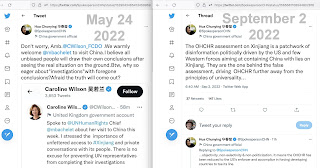In a previous post this blog showed how PRC Internet companies censored information relating to Michelle Bachelet's May 2022 "visit" to Xinjiang in her capacity as UN High Commissioner for Human Rights: https://blog.feichangdao.com/2022/06/Un-Bachelet-Xinjiang-Censorship.html. On August 31, 2022, the Office of the High Commissioner for Human Rights issued its "Assessment of human rights concerns in the Xinjiang Uyghur Autonomous Region, People’s Republic of China." The Office's findings included:
Serious human rights violations have been committed in XUAR in the context of the Government’s application of counter-terrorism and counter-“extremism” strategies. The implementation of these strategies, and associated policies in XUAR has led to interlocking patterns of severe and undue restrictions on a wide range of human rights.Source: https://www.ohchr.org/sites/default/files/documents/countries/2022-08-31/22-08-31-final-assesment.pdf
The extent of arbitrary and discriminatory detention of members of Uyghur and other predominantly Muslim groups, pursuant to law and policy, in context of restrictions and deprivation more generally of fundamental rights enjoyed individually and collectively, may constitute international crimes, in particular crimes against humanity.
[P]atterns of intimidations, threats and reprisals are generally credible and are likely to have caused, and continue to cause, a serious chilling effect on these communities’ rights to freedom of expression, privacy, physical integrity and family life, and in consequence inhibit the flow of information on the situation inside XUAR.
Given the report's conclusions, it is no surprise that the same PRC government spokespeople who welcomed Bachelet's conduct of her Xinjiang visit, were less than complimentary about the Assessment issued on the last day of her tenure.
The official PRC response maintained that the Assessment was "based on disinformation and lies," (https://www.ohchr.org/sites/default/files/documents/countries/2022-08-31/ANNEX_A.pdf) and some foreigners living in the PRC who like to jokingly refer to themselves as paid propagandists (e.g., "wumao") circumvented the Great Firewall to use blocked-in-China Twitter to offer their opinion that the Assessment was based on no evidence or insufficient evidence.
[B]ased on a rigorous review of documentary material currently available to the Office, with its credibility assessed in accordance with standard human rights methodology.
Particular attention was given to the Government’s own laws, policies, data and statements. The Office also requested information and engaged in dialogue and technical exchanges with China throughout the process.The Assessment contained over 300 footnotes, many of which cited to documents and articles published by the PRC government and its officially licensed media outlets. For example, many of the facts set forth in the section titled "Methodologies applied to identify suspects and persons 'at risk' of 'extremism,'" were based on an article published on Sina.com.cn (which was originally published on guancha.cn - a website founded by Eric X. Li and licensed by the PRC government to publish news (互联网新闻信息服务许可证:31220170001).
 |
| Sources: http://news.sina.com.cn/c/2014-12-24/093231321497.shtml | https://web.archive.org/web/20141228193159/http://www.guancha.cn/FaZhi/2014_12_23_304258.shtml |
That article served as the basis for the following statement:
Various forms of conduct associated with the expression of different opinions, stated in broad terms, are also considered a sign of “extremism”. These include, for instance, “resisting current policies and regulations”; “using mobile phone text messages and WeChat and other social chat software to exchange learning experience, read illegal religious propaganda materials”; “carrying illegal political and religious books and audio-visual products or checking them at the residence”; or “using satellite receivers, Internet, radio and other equipment to illegally listen to, watch, and spread overseas religious radio and television programs”, “resisting government propaganda” and “refusing to watch normal movies and TV networks”.In addition, the Assessment made it clear that the PRC government did not respond to its requests for information about several key issues:
As part of an ongoing process of dialogue, on 17 March 2021, OHCHR formally submitted to the Permanent Mission of China to the United Nations in Geneva a request for specific sets of information, detailing various areas of particular interest, including official data, based on its review of the material up to that stage, but did not receive formal response.
OHCHR requested but did not receive from the Government information on the curriculum and skills recognition system in the centres.
This information was requested from the Government of China in March 2021, which has not responded to date.On 9 March 2021, OHCHR requested information from the Government on jurisprudence from Chinese courts and decisions of administrative bodies implementing anti-terrorism and anti-“extremism” policies. No response was received.
Both the US and Canadian embassies reported that their attempts to post information relating to the Assessment on Tencent's WeChat and Sina's Weibo were censored.
PRC-based search engines like Baidu censored search results relating to the Assessment to prevent users from being able to find it. For example, these two screenshots were both taken on September 4, 2022. They show that, while Baidu has indexed over 70,000 pages from the domain where the report was published, any search query containing the word "Xinjiang" will return no results from that domain.
These screenshots were taken the same day, and show that the same query on Bing and Google returned the Assessment as the top result among thousands.
Baidu also censored individual URLs that referenced the Assessment. For example, the screenshots below were taken several days apart, and show that on September 4, 2022, one of Baidu's top results for the query "United Nations Xinjiang Report" (联合国 新疆报告), was a press release titled "United Nations Human Rights Report: China Responsible for 'Serious Human Rights Violations' in Xinjiang" (联合国人权报告:中国应对新疆发生的“严重侵犯人权行为”负责) published on the United Nations' website at this URL: https://www.un.org/zh/node/189019. However, by September 7, 2022 that results was no longer appearing on the first page of Baidu's results for that query.
September 4: https://archive.ph/8Ur0I
September 7: https://archive.ph/fqOBy
One explanation could be that the result was still available on Baidu, and that it was simply appearing on a later page. However, these screenshots show that in fact Baidu had censored that specific URL.
September 4: https://archive.ph/KKZt2
September 17: https://archive.ph/WQ31s
Another possible explanation is that the page itself could have been removed from that URL. However, these archives show that the report remained at that URL at least until the date of this blog post:
- https://archive.ph/8ZkdZ
- https://web.archive.org/web/20220917104111/https://www.un.org/zh/node/189019









